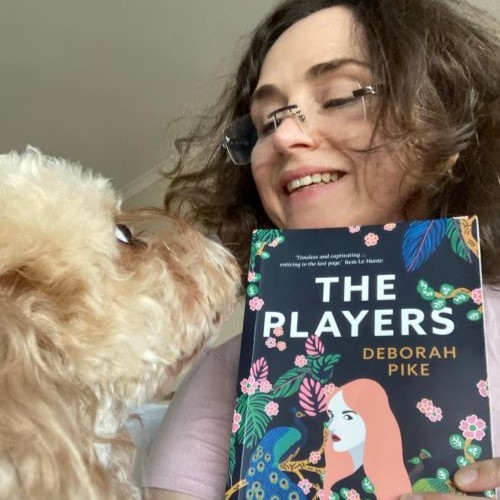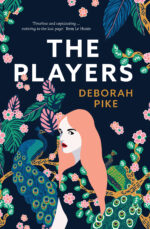Deborah Pike says a hectic work week and a flight to Amsterdam were the genesis of her debut novel The Players

Tim Minchin has called The Players ambitious and moving, Bem Le Hunte says it is enticing, and Melinda Harvey says it is funny and wise. But long before she found herself garnering praise, Deborah Pike was dreaming of a cast of characters whose passion and rivalry would bind them across time and continents. In this interview she journeys from idea to fruition and from Perth to Paris as she takes you behind the scenes of writing The Players.
Can you identify the genesis of this novel? Was there a character you began with first?
A long while ago, I was living and working in Paris. After a hectic period at work, I took a break and caught a flight to Amsterdam. As my plane touched down, a ‘macro’ vision of the novel came to me . There it was – a novel about putting on a play, images of a cast from diverse backgrounds. The Australian bush. The afterlives of the actors. Travel and the cognitive dissonance of moving across the globe.
After that, each of the characters began to ‘speak’ to me rather loudly, often at the same time, and then I had to work fast to understand them, and find out who they were and what they were telling me.
I was first interested in the question of what brought these various characters to the play and what inspired them to act. So I began exploring their childhoods. Veronika’s came first.
What was the most challenging aspect of writing the novel?
There were a few challenging aspects. The first was structural: how to deal with so many competing voices. The plot in the first draft was also rather elaborate. I had to pare it down significantly.
Working with points of view very different from my own was challenging. Not because I found the points of view difficult to inhabit, but because it is important to write with cultural sensitivity, and with sensitivity to different identities; there’s a lot at stake. I am fully aware of the debates and pitfalls in relation to this question – for me, honouring the differences and multiplicity of the characters was crucial. Plausibility, respectfulness and humility were my ideals. It meant reading a lot, both fiction and non-fiction, and working with cultural consultants and sensitivity readers, which was an enormous pleasure and a very satisfying process.
I believe that art brings people together. The novel demonstrates this (even if the characters argue a lot!). Despite seemingly incommensurable differences in identity, culture, material, social, psychological and familial circumstances, individuals are bound by a common humanity. This common humanity in no way erases inequities or differences.
What were some of your literary influences in this novel?
My main influences are probably theatrical. Obviously, Pierre Beaumarchais’ play, The Marriage of Figaro, has influenced my novel, with its themes of desire, power, exploitation, class conflict and revolution, disguise, gender and performativity. The play is still relevant today, especially in the #MeToo era. I was interested in how the text itself ‘travelled’: the play is both bounded and unbounded by space and time. Figaro is better known as an exquisite opera by Mozart, but in France, people know it also as a play, as students are obliged to study it (often strenuously against their will) for their Baccalaureate.
I was influenced by Anton Chekhov – in particular, The Seagull – and the way each of the characters is in love with the ‘wrong person’ and the havoc and heartbreak (and sometimes comic pathos) that ensues. Veronika is not unlike Chekhov’s character Nina. It’s also metatheatrical. The Cherry Orchard was perhaps somewhere in the back of my mind – the narrative possibilities of such a setting. I do enjoy Restoration comedies, including the plays of Aphra Behn. Undercurrents – the bittersweet ironies – of William Congreve’s dark, satiric comedy of manners, The Way of the World, are in my novel somewhere.
In terms of literature, Honoré de Balzac’s The Human Comedy inspired me – his is a vivid panorama, depicting the complexity of human beings from varying levels of society. I like Dickens’ work for the same reason. There are hints of Great Expectations in there. I have long loved the work of Henry James, especially The Portrait of a Lady. I admire Thomas Hardy’s Far from the Madding Crowd. I do not compare my work to these geniuses for a millisecond; nonetheless, James’ and Hardy’s flawed heroines are an inspiration, with their compelling romantic dilemmas.
My research for the novel led me to engage with and be informed by work from different cultures and traditions, including the writings of Luís Cardoso and José Ramos-Horta, in addition to Australian writers such as Katharine Susannah Prichard.
Not all of my influences and tastes involve theatre and literature. I grew up glued to sitcoms and screwball comedy. I appreciate classic rom-com films. It dawned on me recently that in some ways The Players is structured a lot like Love Actually, except without the ageing rocker character played by Bill Nighy.
Where did the title ‘The Players’ come from?
The novel has had a few titles. Because I saw it as a bildungsroman of sorts – a coming-of-age story – I was interested in how people ‘become’ who they are, how they self-actualise; there are no doubt turning points, events, circumstances in one’s life which accelerate that process or mould a person in some way. I was interested in how the play could be that sort of a moment for each of the characters.
Philosopher Friedrich Nietzsche wrote a great deal about this. While reading his work, I got distracted by a line from Thus Spake Zarathustra. The speaker in the roundelay opening the book exclaims that woe is deep but insists that joy is deeper still and that woe must be sent away because ‘All joy wants eternity’. So Joy Wants Eternity was the title for the first draft of the manuscript as I was drawn to the idea of joy being the more profound emotion than woe, as a kind of Nietzschean affirmation. And joy is a thread throughout my book: artmaking as connected to joy. However, that title grew to seem portentous. And I feared the novel was overburdened with mixed philosophical references.
I then switched to Dramatis Personae – literally, the characters of the drama. That was the second and third draft titles. I found it apt because it’s a character-driven novel, largely about the theatre. I later discovered that one of my poetic heroes, W.B. Yeats had written an autobiographical book of the same title about his artistic influences. I was convinced it was the coolest title ever. But it didn’t stick.
I went back to Zarathustra (as you do), and in it Nietzsche writes briefly about a pair of ‘players’. One reader suggested ‘Zarathustra’s Players’ as a title, but it didn’t sit quite right with me. On a train journey coming back from lecturing on posthumanism, it came to me – The Players. And it felt right. There is the reference to the old word for actor – a player. But there is also the connotation of the sort of player who manipulates, deceives, ruthlessly seduces. While the characters in The Players aren’t as bad as all that, perhaps they are players without realising it. Characters are also ‘played’. Again, without necessarily being aware of having been played, or of having ‘played with’ another. So that is how the title came to be.
What is next for Deborah Pike?
Currently I am working on a non-fiction book for Bloomsbury, about overlooked writers of (mainly) early twentieth-century modernism. It’s a sort of global literary archaeology. My hope is that by inviting readers to consider a broader array of voices, perspectives and writings from the period, we might also rethink some of our more commonplace understandings about it.
In terms of fiction, a few strong plotlines have come to me quite vividly. The characters of The Players are still very much alive and they bother me every so often, urging me to shape their destinies further. But I also have a lot of other voices jostling around, who want to me to tell other sorts of tales. Writing for me is just a form of overhearing, heeding to the characters’ stories, trying to relay them as best I can. They tell me if I get it wrong. And when I’ve got it right, they leave me in peace. At least for a while.
The Players is available in all good bookstores and online. Tickets to the Sydney launch are on sale now.



